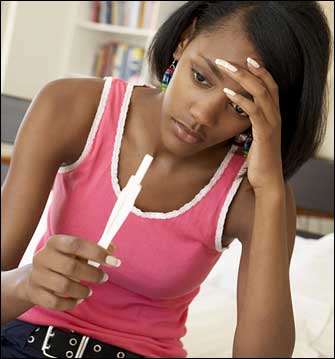
Relationships are complicated enough, but what happens when another person is thrown into the mix? No, I’m not talking about a love triangle or a nosy person who is interfering in your personal love life; I’m talking about a baby. Many teenagers aren’t consciously thinking about settling down with their partner and having kids, but for some it happens unexpectedly. And what do you do if you find yourself pregnant while still in school and unmarried?
For most couples, having a baby in general brings about a lot of stress and anxiety. There is concern about the fetus’s health, getting money to support the baby, figuring out if one of the parents will stop working to care full time for the newborn, and many other things that need to be thought out before the child even comes to be born. Some couples are so stressed by the event that their relationship can deteriorate as hormones and emotions go wild.
If you are a teen engaging in unprotected sex you can get pregnant. There are myths that say if a girls on top, if you have sex in water, or if you have sex on your period you can’t get pregnant. None of these are real! The only true way to avoid getting pregnant is abstinence, but we all know many teens don’t want to abstain from sex. So if you are ready to take your relationship to that level its important you use a condom and think about going on birth control.
But what if you weren’t told these things and it’s too late; you or your girlfriend is in the process of having a baby. How can a young teenage couple handle what lies ahead of them? What can you do to reduce the stress and other negative emotions you and your partner may be experiencing? A major thing is to know what you are in for. Take time to read parenting books, talk to doctors about the potential risks teens have when giving birth, such as babies being premature, and if there are ways to reduce those outcomes.
Secondly, talk with your partner about what your future is. There is a chance that you will get married or you may also decide it’s better to share custody but not continue in your romantic relationship. If you realize that your significant other doesn’t want to stay then discuss ways to make sure they continue to participate in the child’s life. Find a way to make the future the best you can possibly give your unborn child.
A third way is to surround yourself with those who are willing to help you and your partner during the pregnancy. Some teens are lucky and have parents who are supportive and promise to help raise the child. This compassion and love helps the soon-to-be parents navigate through things like Lamaze classes, doctors appointments, and periods of fear, anger, or confusion. But not everyone has such understanding parents. Some teens are rejected by family and made to struggle on their own. But even then there are others who are willing to lend a helping hand. Look for those friends or trusted adults.
You can go to informational websites and hotlines for help if you feel there is nowhere else to turn. America’s Pregnancy Helpline can be contacted at 1-888-672-2296 and have a special section just for teens. For counseling you can contact Planned Parenthood Federation of America at 1-800-230-7526 or Birthright International at 1-800-550-4900 or online at http://birthright.org.

